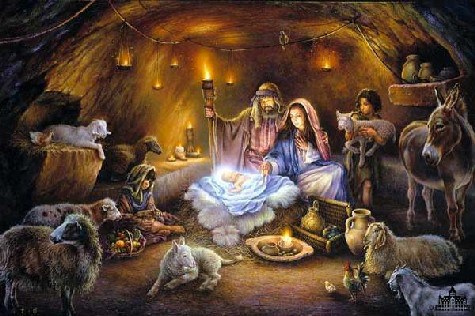OF THE FATHER'S LOVE BEGOTTEN
CHRISTMAS DAY REFLECTION
by: Msgr. Jeffery Steenson
Ordinary of the Personal Ordinariate of the Chair of Saint Peter
Of the Father’s Love Begotten
Of the Father's love begotten, Ere the worlds began to be,
He is Alpha and Omega, He the source, the ending he,
Of the things that are, that have been, And that
future years shall see, Evermore and evermore.
-- Aurelius Clemens Prudentius, 348-413 (Hymn 20]
On Christmas Eve, we look imaginatively at Christ's birth from many perspectives. We've heard the Christmas story from the point of view of Mary and Joseph, the Shepherds keeping watch over their flocks, the Wise Men journeying from afar, the Angels flying high over Bethlehem, the Innkeeper who turned the Holy Family away, wicked King Herod consumed with fear and jealousy, even the animals in the stable, and the manger itself. But let us, as best as we can, letting the Scriptures be our guide, try to see this blessed event of the Birth of the Messiah from the Father's point of view.
Prudentius, the author of this beautiful hymn, was one of the Church's first poets. This Spaniard was a lawyer who turned from the glamour of public life to write Christian poetry, some four hundred years after the birth of Christ. His hymn expresses the deep and mysterious truth of the Nativity -- "Of the Father's love begotten, Ere the worlds began to be." Jesus Christ did not have a human father, because He has always existed eternally with the Heavenly Father. Before the Old Testament, before Abraham, before Creation, the Son of God lived with the Father. Everything else that was, that is, that will be, finds its life in Christ. His appearance in Bethlehem, the Nativity, is part of God's everlasting plan.
"For God so loved the world, that He gave His Only-Begotten Son ..." As the Father looked down from Heaven on the night Christ was born of the Virgin Mary, He declares: "Here is My only Son, my gift to the world." This was a gift with no strings attached, and the Father knew full well what it would mean. All the Old Testament prophecies about the suffering of the Messiah make it perfectly clear that this was all factored into God's plan. The Father willed for this to happen from the very beginning of man’s disobedience. He has demonstrated His faithfulness for millenia, even when it might have been very tempting to give up on His fickle people.
Tonight, as our Heavenly Father looks down on us, His Promise remains as true as ever -- "I will be your God and you shall be My people." There is so much uncertainty about our lives, so many changes that threaten to overwhelm us, so much uncertainty about the future. And yet here is a Promise we can really depend upon. When we think of the Father in Heaven tonight, and His Son reigning with Him, let us think of the most extraordinary LOVE that binds them to each other and reaches out to us.
From Leo the Great’s Tome (449), the most important papal document ever:
So without leaving his Father's glory behind, the Son of God comes down from his heavenly throne and enters the depths of our world, born in an unprecedented order by an unprecedented kind of birth.
In an unprecedented order, because one who is invisible at his own level was made visible at ours. The ungraspable willed to be grasped. Whilst remaining pre-existent, he begins to exist in time. The Lord of the universe veiled his measureless majesty and took on a servant's form. The God who knew no suffering did not despise becoming a suffering man, and, deathless as he is, to be subject to death.
By an unprecedented kind of birth, because it was inviolable virginity which supplied the material flesh without experiencing sexual desire. What was taken from the mother of the Lord was the nature without the guilt [of original sin].
Putting aside for the moment the rich cultural themes of Christmas, let us go right to the heart of the matter. Our Pope Emeritus, Benedict XVI, has written of how deeply disturbing the Incarnation is for the modern spirit; it is expected that God will remain in the spiritual realm, but He certainly does not belong in the material. But this is precisely what God has done. He has entered the world he made, the Creator now becomes the Redeemer, and what follows is a new creation (Jesus of Nazareth: The Infancy Narratives, pp. 56-57). The Father sends His Son into the world to unite/sum up/recapitulate all things in him (Eph. 1:10). It is fundamentally a new beginning, as God resets the clock and renews His creation.
We who are baptized into Christ but who yet await the moment of our resurrection, live, as it were, with one foot in each created order. The Church asks us to celibrate Christmas with this sense of anticipation of the wonderful healing, the joy, the perfection of life in all of its fullness, “a fundamental element of our faith and a radiant sign of hope” (p. 57).
Msgr. Jeffrey Steenson
Msgr. Jeffrey Steenson was appointed by Pope Benedict XVI as first Ordinary of the Personal Ordinariate of the Chair of St. Peter on January 1, 2012. After 28 years as an Episcopal priest and Bishop of the Diocese of the Rio Grande, Msgr. Steenson was ordained a Catholic priest in 2009. He teaches Patristics at the University of St. Thomas and St. Mary's Seminary in Houston, TX

